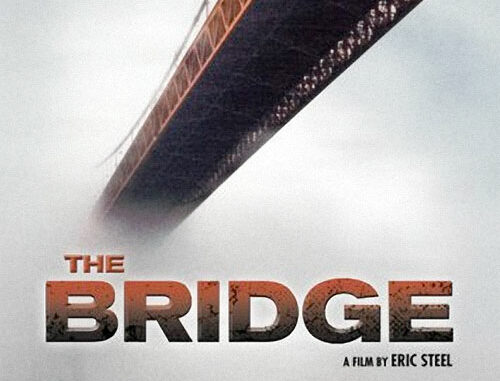
If you’ll forgive me I’m going to throw caution to the wind and begin on a wild generalisation. These days [I know, but stay with me] films are not what they used to be. Now before you hyperlink off or three-finger swipe your way back I would like to clarify. This is not a wearisome diatribe on the degradation of the great art of film making, nor a plea for a return to the Golden Age of cinema: I refer only to the technical possibilities of film. You see, The Bridge is a film that simply couldn’t have been made without the invention of digital video.
Ok, you’ve caught me, I’m being needlessly provocative for the sake of an energetic opening paragraph, yet the point still stands. Not only that but within this cheap trick lies a fitting parallel for the problems faced by Eric Steel’s 2006 documentary.
The Bridge is a film about suicide. Not only that though, its a film almost entirely constructed from footage of real life suicides and suicide attempts. The eponymous bridge, as is made evident within the stately opening shot, is the iconic Golden Gate Bridge of the equally iconic city of San Francisco. For one year around 20 cameras were trained on its 2,737 metres to capture on tape the 40 or so suicides that occur each year. A small group of these become the focus of the film, with talking head interviews giving us a greater sense of their characters and the consequences of their actions.
With a concept is so strikingly direct it’s hardly any wonder that the film remained under seen and under appreciated. The mainstream is not likely to embrace such a piece, nor fund it, and here we come to the crux of my opening gambit. Video may not have blessed the world with a greater aesthetic medium — it is, by the way, the reason Dr Who’s CGI monsters and magic moments always refuse to mesh into their surroundings — but its gift of infinite runtime is essential to modern and cutting edge film making.
After shamefully little research I can confidently say that to run 16mm film stock through just a single camera for 24 hours a day for 365 days would cost an eye watering £4,380,000: somewhat outside the average indie director’s budget. Not to mention the administrative nightmare of changing reels every 11 minutes or sifting through and editing the resulting 8,760 hours or footage without the aid of super fast, digital spooling.
But now we’re past the nitty-gritty-techy-type side of the film, I think its time to make some comment on the emotional impact of these scenes. You might, by now, be annoyed at me for trivialising the undoubtedly hefty subject of suicide with talk of capture capacity and indie film budgets, and I’m afraid your half right. The subjective fact of the matter is that The Bridge is an experience that must be viewed to be understood. Actually, I’d go one further, it must be viewed. The realities of good journalism mean that this statement would not, on its own, constitute a solid review, but that is really all I have to say. Once you’ve broken through that first harrowing build up, the impact is far more sophisticated than simple shock and horror. The knee jerk revulsion fades, giving way for an honest reappraisal of the big “Why?”.
The humanitarian in us would like to empathise with people who see death as a logical solution, but few can. Within the boundaries of this modest and unpretentious film I was genuinely given a new perspective on life, and I don’t care how immodest or pretentious that might sound.

Powerful film, nicely considered. I live in SF and thought it a revelation. Technique added a ghostly immediacy. Not pretentious of you at all. Thanks.
? The image captures an important aspect of the film though this is a study of corporate power, no one appears powerful.